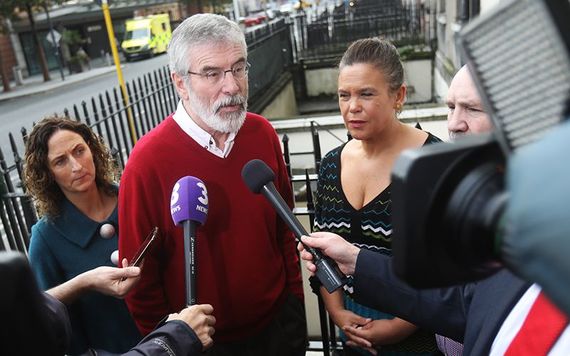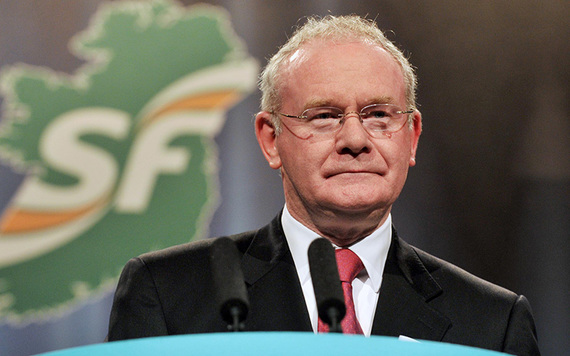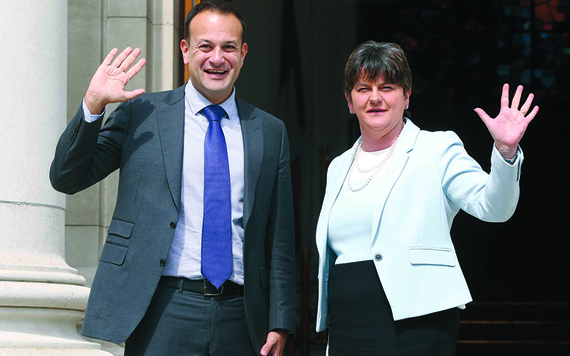Top historian Tim Pat Coogan looks at the political landscape in the wake of the Adams departure and asks can Michelle O'Neill and Mary Lou McDonald move Sinn Féin forward in 2018?
Obviously few headline writers could resist the temptation to caption the handing over of the presidency of Sinn Féin from Gerry Adams to Mary Lou McDonald: Hello Mary Lou. And in the event very few did. The handover becomes official next week at a special convention.
But in truth when one surveys the Sinn Féin scene, particularly in the North the situation is not all that welcoming for Mary Lou. To some party mandarins, and there are such unseen figures who exert a good deal of influence, Mary Lou suffers from the disability of not having a military background. Overall Gerry Adams’ shoes will take some filling, particularly in Northern Ireland.
Read more: Sinn Fein’s leader switch a major gamble

Gerry Adams and Mary Lou McDonald. Image: RollingNews.ie.
Adams will walk tall in the history books from the way he managed the Peace Process, particularly from the early 80s to the signing of the Good Friday Agreement. Endlessly patient, eternally vigilant, astute and acutely aware of the time and tide, he delivered what many believed was impossible.
He saw the implications of Bobby Sands’ success at the polls while on hunger strike to the death and it began to register within Sinn Féin from 1981 on. Politics could work. The Armalite could be exchanged for the ballot box.
But Gerry Adams, Martin McGuinness, and the others who made the deal risked death from the hardliners on their own side for over more than a decade of dangerous, tortuous negotiation before peace was achieved.
Read more: Gerry Adams’ political journey from 1983
Adams and McGuinness risked much to bring peace to Northern Ireland

Martin McGuinness. Image: RollingNews.ie.
In the end, the Good Friday Agreement was the outcome. But it was Adams and McGuinness who helped to achieve the conditions which made the Agreement possible, literally at the peril of their lives.
The pair had initially owed much of their ascendancy within the Republican world to their campaigning against a ceasefire, that of 1976, which they correctly diagnosed as being bogus, a British ploy—accompanied by a pressurizing wave of sectarian assassination—to draw out the IRA into the open.
Adams and McGuinness passed the acid test of public men. Did they leave their people better or worse than they found it? Better must be the answer.
However, as Mary Lou takes over she confronts one devilishly complex landscape. She deserves to be regarded as one of the ablest politicians in the Dáil. But in southern Ireland, she must toil with the reality that somehow, Sinn Féin, a left-wing party, while it has done extraordinarily well in some respects, nevertheless failed to capitalize greatly from the banking crash.
Adams had helped to bring the Party to a position of influence that would have been unthinkable at, say, the time of the H Block crisis but Sinn Féin did not show itself able to take advantage of “normal” politics.
Sinn Féin did not take advantage of the crash to pose themselves as the best political alternative for Fine Gael and Fianna Fáil

Mary Lou McDonald and Michelle O'Neill. Image: RollingNews.ie.
The bankers and the southern elite’s decision makers responsible for the crash largely escaped retribution despite a rising tide in suicide rates, bankruptcy, homelessness and emigration. Sinn Féin achieved and remained at, a plateau of around 20% of the electorate. Mary Lou’s challenge will be to grow that figure by about half.
Looking at the northern landscape in the wake of the Adams departure, certain other well-known lines occur:
God in his mercy, look down on Belfast,
To hell with the future.
We live in the past.
Michelle O’Neill is proving herself a competent, albeit heavily-scripted, spokesperson for Sinn Féin, but she is facing an ugly, dangerous rerun of history. We are witnessing the outcome of the Orange Card being played yet again. The Tories and the DUP are in lockstep over Brexit, in blind disregard of the harm this disastrous policy has done and will do, to both electorates.
Read more: From Troubles to peace – rare Northern Ireland archives go online

DUP leader Arlene Foster. Image: RollingNew.ie.
The North is a hand-out economy, heavily dependent on Public Service employment. Nevertheless, in the Brexit referendum, the DUP leader Arlene Foster solemnly urged the Six County farming community to vote themselves out of the E.U., with the loss of the vital Brussels subsidies which underpin EU farmers.
The DUP has only nominally accepted the Good Friday Friday Agreement—the Belfast Agreement as they refer to it, so as to avoid any Catholic implication. Sinn Féin has increasingly found that dealing with the party was like playing handball against a haystack—nothing came back. At the time of partition, the British initially offered the Orangemen the full nine counties of Ulster. They choose six because they could control the amount of Catholics they contained by fair means or foul. The Good Friday Agreement was only accepted with varying degrees of reluctance by the Unionist family.
The DUP has consistently refused anything that appears to bring the North closer to Dublin

Taoiseach Leo Varadkar and DUP leader Arlene Foster. Image: RollingNews.ie
After the Berties, Blairs, the Kennedys and the Clintons went home, the DUP reverted to type. Corruption flourished and anything that could be portrayed as pandering to nationalism and moving closer to Dublin and a united Ireland was used to frustrate cooperation with Sinn Féin. The collapse of Stormont became inevitable.
The present talks about restoring Stormont are not really dependent on an Irish Language Act as envisaged by the Good Friday Agreement. There would, of course, be an enormously damaging loss of Sinn Féin support should the party give in on the issue. But the real issue is: Can the DUP co-operate with nationalists or must the party have change inevitably forced on it by the rapidly changing demographics of “Ulster?”
The next census is due 2021. It will tell the tale of an ever-dwindling Unionist majority. There are shifting political currents in England and the Conservatives may be ousted by Labour which would put Sinn Féin in a far stronger position vis a vis London than it is in now.
Despite what commentators in Dublin and RTÉ say to the contrary, with the DUP in relentlessly negative mode, realpolitik does not indicate any compelling reason for Sinn Féin to cooperate in restoring Stormont at this juncture.
There is a contemporary, gender-balanced version of the biblical version of the Three Wise Men at the levers of power in Ireland (Arlene, Mary Lou and Michelle). But, as Adams departs, the question that arises is: Are the Three Wise Women following a star that leads to Bethlehem or, to paraphrase Yeats, discovering what Uncouth Beast is slouching off to Belfast to be born?
---
Tim Pat Coogan is a leading Irish historian and journalist who has published many best-sellers, including “Wherever Green is Worn.” and groundbreaking biographies about Michael Collins and Eamon De Valera.




Comments